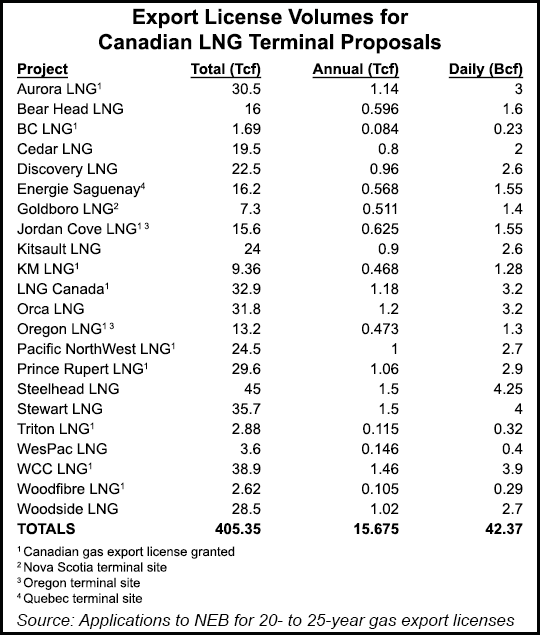Regulatory | Infrastructure | NGI All News Access
BC Bans Possible Conversions of NatGas Pipes to Oil Service
The British Columbia (BC) government has set out to appease environmental and native critics by banning a possibility that no one in the industry has raised: converting to oil service pipelines that were originally built for liquefied natural gas (LNG) export terminals.

“Concerns were expressed during environmental assessments and by First Nations about long-term pipeline use,” said BC Natural Gas Development Minister Rich Coleman and Aboriginal Relations Minister John Rustad in a joint statement Wednesday.
The regulation, enacted by the Liberal cabinet under the provincial Oil & Gas Activities Act, prohibits the BC Oil and Gas Commission (BCOGC) from granting a permit to switch a gas pipeline built for an LNG facility over into oil or bitumen deliveries.
Environmentalists and native groups raised fears of service changes after TransCanada Corp. unveiled the Energy East proposal for partial conversion and extension of its natural gas Mainline into an oilsands conduit from Alberta to the Atlantic coast.
The first half of TransCanada’s Keystone XL project, in operation for four years, switched a vacant, aged gas pipe in the western half of the Mainline over to oil service.
Proposals for new oil delivery capacity from northern Alberta across BC to tanker terminals on the Pacific Coast have aroused passionate fears of spills and opposition among environmental and native coalitions.
The gas Mainline runs from southeastern Alberta to Ontario, Quebec and export crossings into the U.S. Midwest and northeastern United States. The route goes nowhere near BC.
However, TransCanada sponsors a number of westbound gas pipeline projects across BC from northern shale deposits to proposed LNG terminals on the Pacific Coast as additions to its Alberta supply gathering grid, Nova Gas Transmission Ltd.
In enacting the BC ban on oil conversions, the provincial government named all six of the biggest plans yet for gas pipelines to LNG export terminals and added that the list can be expanded if more proposals are made.
Rustad expressed hope that the prohibition will spare LNG projects, which the provincial Liberal regime avidly supports, from the protest heat and delays that the oil pipelines continue to face.
“Many First Nations want to work with the Province and proponents on major natural gas pipeline developments, but some have strong and differing views about oil or diluted bitumen pipelines,” said the aboriginal relations minister. “A regulation prohibiting the automatic conversion of natural gas pipelines for these purposes goes a long way to address the concerns we have heard.”
But the anxiety over potential oil conversions is most pronounced among Pacific Coast communities. In the more remote northern interior of BC, fear focuses on horizontal drilling and hydraulic fracturing, which the industry said will be required to fill LNG terminals and pipelines.
The first TransCanada-Nova proposal for an LNG feeder service to reach the stage of a construction application to the National Energy Board (NEB) — the North Montney Pipeline — has come under fire from six northern native communities.
Fort Nelson First Nation, with claimed traditional territory straddling BC’s thickest shale gas deposits, calculates that its forests, bush and muskeg swamps will eventually be invaded by hives of industry as LNG exports develop over the next 20 years.
In projections filed with the NEB, Fort Nelson alone foresees up to 4,000 unconventional wells, 333 production facility sites, 1,665 kilometers (1,040 miles) of roads, 3,300 kilometers (2,060 miles) of pipelines, and 1,277 square kilometers (510 square miles) of disturbed land in its future if the LNG export sector fulfills industry and BC government hopes.
Virtually all the gas targeted for LNG projects is in shale deposits. No officials have raised any possibility that the BCOGC will be barred from granting drilling permits. Government and industry agencies are collaborating on working out a regulatory regime capable of withstanding hostile environmental, native and political opinion.
As gas development minister, Coleman repeated that BC continues to regard LNG development as a once-in-a-lifetime opportunity capable of generating provincial jobs in the tens of thousands and revenues in billions of dollars.
While Canadian LNG export schemes have been deferred or fallen silent since the fall collapse of oil and liquid fuels prices, BC still posts an official list of live projects that includes 18 Pacific Coast terminal proposals out of a national total of 22.
© 2024 Natural Gas Intelligence. All rights reserved.
ISSN © 1532-1231 | ISSN © 2577-9877 |
